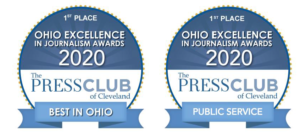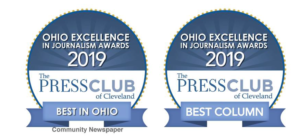For this final installment, a few clarifications and recommendations.
First? There are so many people in the city of University Heights who support public education, in general, and our high school students at Wiley, in particular.
Friends, please accept my tardy gratitude and acknowledgement for your support and dedication to this issue. It is because I know you are out there that I feel permitted to write as I have, to amplify our voice, one which sometimes feels ignored or diminished. It feels like we are muffled under the clover tuft in Whoville, crying out desperately, ‘we are here, we are here, we are here!’
Defining the shorthand
When I write ‘my city’ I am using shorthand, one that might have different meanings in different contexts. Most often, I am speaking about the city administration, policies and the like. University Heights City Council is not part of my critique on this issue. From my conversations with council members, I’ve found most to be supportive of our schools, and of the Wiley plan moving forward. More than a few council members seem just as frustrated with this process. Councilman Sims has been particularly vocal, speaking both at the June 25th Planning Commission meeting, and allowed me to share his response to a concerned resident’s email, which I referenced in Part 2, Define: development.
The problem is, council voices on this matter must wait until the Planning Commission moves the project into their purview with a vote. Any vote. But now they are listening. Carefully. Write your council members to ask for their continued support and offer them yours. Let them know that you support the schools, you appreciate them supporting the schools, and that you want them to continue to do so. And thank them. It’s bound to be an interesting session, when this project finally enters council chambers.
Back to the shorthand, though. Other times when I say ‘my city,’ I am identifying the loudest voices and assumed de facto attitudes of our populace…many of which we should be deeply concerned about. Fear is turning gangrenous, and little is being done to contain its spread.
We all get a voice. Until recently, though, the most vocal citizens have had negative things to say about our kids and our schools. I’ve tried to be careful, using modifiers like ‘some’ residents whenever I can. Always and never/all or nothing talk is dangerous. Unless it’s to say ALL residents have a stake in supporting our public schools, even if your family is not currently using them. Carole Moran Krus is a UH resident who can appreciate this.
“I’m a UH resident, fully supportive of the CH-UH schools, a former Gearity parent, and current Gesu parent. I’d like to reiterate a comment made by another Gesu parent: there is no pervasive or direct animosity for the CH-UH schools in the Gesu community, as far as I know. As a property owner, I can think of nothing better than for our schools—especially Heights High—to succeed and grow! We live 2 blocks from Wiley, and you have our family’s support!”
A rework of the district motto, three communities, one district: three options [public, private, parochial schools], one goal. Educating our children and strengthening our community.
I was so pleased to read this from Carole. Our private school neighbors and families are partners, not adversaries, welcome and necessary in this conversation. Some parents may be less informed, not out of apathy or disregard for their community schools, but out of the sheer demands of work, home, parenthood and whichever PTA or PTO to which they have committed their time.
How can we help?
Offer good, solid information and candid conversation. Private school parents I have spoken with are receptive to learning about this process, and are often shocked at where the road has led thus far. Talk to your Gesu, Fuchs, Laurel or US neighbor. Don’t assume that because they have chosen private education for their child they are any less invested or interested in what is happening with their tax dollars and their public schools.
Private school families should reach out to CH-UH neighbors, as well. Talk to families at every level. Gearity and Canterbury each have UH families making up about 30% of enrollment. In fact, nearly every elementary in the district—inside Cleveland Heights boundaries—serves UH families. Current enrollment bears this out. Obviously, Rox Middle, Monticello and CHHS all serve UH kids. It bears repeating…these are all our kids—street, ward and zip code be damned.
So ask open questions, get real experiences. Engage your teenage neighbors as well. Adolescents will give you the real skinny, even if they are slow to engage. Ask their experience, listen, and keep an open mind.
Be willing to grow
I was a Catholic, private school girl, myself, growing up in a city about the same size at University Heights. It was a mostly white, working class town with lots of pizza and jojos and a really good swimming pool.
As a parent, I have spent time rubbing both sides of the school coin. Heads! My daughter attended a private Montessori school through half of first grade. Then, tails! We switched to public school. Truth? I had to face many of my own, rusted-in-place perception issues. It was hard, scary, and at times ugly. It was incredibly uncomfortable, facing biases I hadn’t even noticed. But I did it, and I’m glad I did. It felt like growing up.
We are all in this together—public, parochial, elite, homeschooled families. Candid conversations and open minds will serve us well, no matter the protocols, politicians and procedure. This is our community. The more we connect, we more we’ll see how we’re all connected.
Read Part 1, Part 2, Part 3, Part 4



There’s surely nothing friendlier than calling the people who don’t agree with you “racists”. Right, Krissy and Joan?
Yes, you and the whole FutureHeights/Reaching Heights/Heights Observer mob are victims in CH and UH.
smh
————–
“It is because I know you are out there that I feel permitted to write as I have, to amplify our voice, one which sometimes feels ignored or diminished. It feels like we are in muffled under the clover tuft in Whoville, crying out desperately, ‘we are here, we are here, we are here!’”
Y’all had at least four lovely, color glossy mailings and door hangars, the summer Update mailing, the district’s superintendent and PR staff, plus R Strategy, the district’s PR flack and the campaign’s hired gun all speaking in your “voice”.
You guys are unreal.
————-
“It is because I know you are out there that I feel permitted to write as I have, to amplify our voice, one which sometimes feels ignored or diminished. It feels like we are in muffled under the clover tuft in Whoville, crying out desperately, ‘we are here, we are here, we are here!’”
Patti,
I’ve appreciated your thoughts and detail.
I can’t help feeling the school board has some culpability in the sour relationship that has existed for years between the district and University Heights. I know that was the case in Cleveland Heights, where the relationship has finally become much more functional after turnover on the school board, the CH city council and the CH city manager’s office.
Aside from the many communications the board claims to have had with Mayor Infeld’s administration regarding this specific project, do you know if/how the board has been working on an ongoing basis to improve the relationship?
thanks for your thoughtful query, Bob. and you’re right. i have been looking into this very question, and will post more on it soon. i imagine that things are strained right now, and i sense an urgency to just get through this particular stage. but yes, a focus on relationships both now [perhaps, especially now] and moving forward is essential…from both the cities and the district. it may, indeed, be what helps us *get* through this volatile stage.
the students are taking some leadership in reshaping the narrative as well, with an aim to build relationships with UH neighbors that need to be stronger, and based on real experiences with our student body and not warped perceptions. this, i think, is a fantastic approach, but it is not on the shoulders of our teens to heal this decades-long schism.
positive momentum is building in many parts of our community, though, and i certainly admire our students’ efforts to demonstrate the kind of leadership i hope to observe in more of our adults.